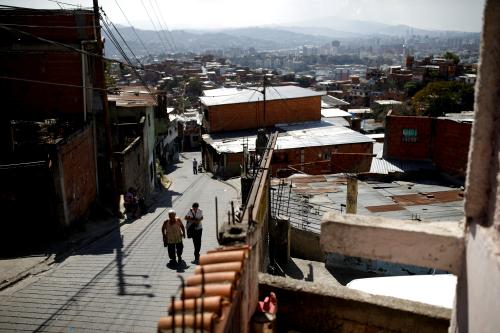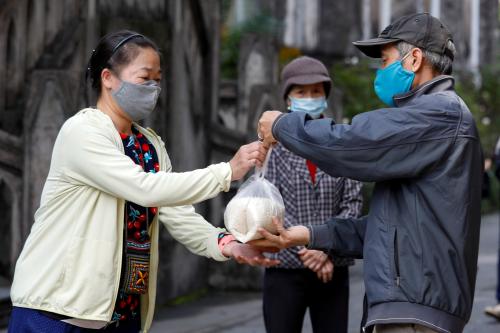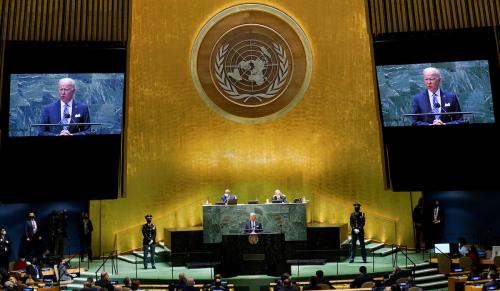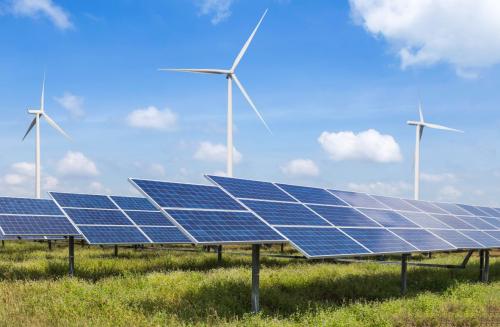A range of recent articles and analyses have exposed the inadequacy of the U.S. international response to COVID-19 and made the case for a reassertion of U.S. global leadership. What has received insufficient attention is how with one stroke the U.S. can both promote our health security and assert our international leadership. That stroke is to make good on a decade of growing arrears—obligations that are past due—to the multilateral development banks (MDBs). This action would restore U.S. moral and financial leadership to organizations that are providing critical levels of funding and technical knowledge to help developing countries bolster their defenses against the pandemic.
Political context
On May 8, Senate Democrats introduced legislation that would authorize a holistic and extensive U.S. international response to the COVID-19 pandemic. Section 218 of the bill acknowledges the U.S. shortfall to the MDBs by directing the Secretary of the Treasury to clear arrears to the World Bank Group from fiscal years 2019 and 2020. But this is an authorization bill so it does not provide the required funding.
Separately, Republicans and Democrats are developing plans for a fifth CARES Act. But the focus appears to be almost solely on the domestic, not international side.
A group of 26 former members of Congress yesterday sent to congressional leaders a letter urging them to “support robust resources for the International Affairs Budget dedicated to America’s leadership in battling this pandemic around the world—to keep us safe and to protect our economic recovery at home.”
A group of civil society organizations has also sought to correct the oversight by joining their technical and policy knowledge, and advocacy capabilities, to outline a constructive $12 billion international program for this expected legislation.
What needs to be brought into this mix of efforts is a fix to the damage being done both to U.S. leadership and the programmatic efforts of multilateral development banks.
Arrears
U.S. arrears to MDBs jeopardize both their effectiveness and our influence in their governance. The MDBs provide two types of finance—non-concessional (at market lending rates) and concessional (grant assistance). All of these arrears are in the concessional category. It is this grant assistance that poor countries—plagued by inadequate domestic resources and often high debt burden—find of greatest value as they often cannot qualify for market lending and definitely cannot afford it. Voting in the concessional windows of MDBs is keyed to contributions, so not only are we undercutting the ability of these institutions to assist the neediest countries, but we are also short-circuiting our own leadership. Beyond that, failure to honor our financial commitment undermines our moral suasion and voice.

In addition to these current funding arrears, the administration’s fiscal year 2021 budget request would add a further shortfall of $267.520 million for the International Development Association and $24.697 million for the African Development Fund, so the fiscal year 2021 appropriations bill should make that up.
MDB COVID-19 actions
These organizations are at the forefront of confronting the challenge of the pandemic. The World Bank Group has committed to over $160 billion of funding over the next 15 months to help countries respond to immediate health consequences of the pandemic and to bolster economic recovery, and it has already allocated $12 billion to 132 projects in 92 countries, mainly through its core institutions (International Bank for Reconstruction and Development or IBRD, and the International Development Association or IDA). It is establishing a new Health Emergency Preparedness and Response Multilateral Fund. Also within the World Bank Group, the International Finance Corporation (IFC)—the private sector window of the World Bank Group—has committed to fast tracking $8 billion to support its investor clients in sustaining employment, and the Multilateral Investment Guaranty Agency (MIGA) is fast tracking $6.5 billion for governments and investors to tackle COVID-19. Every dollar the U.S. has pledged in the most recent replenishment of IDA (IDA-19) garners $27.30 in new commitments for the world’s poorest countries. How otherwise would the U.S. garner such levels and leverage of funding to help the poorest developing countries attack their poverty and stem the pandemic?
Further, the Asian Development Bank has committed to $20 billion and a more flexible and streamlined process for a COVID-19 Response Package. The Inter-American Development Bank has authorized the reprogramming of existing resources to health emergencies and an additional $3.2 billion for 2020—for a total funding level for this year of $12 billion to respond to the health crisis and its consequences. Its private sector arm, IDB Invest, has committed $5 billion.
Why this matters
Why does the U.S. arrearage matter? Because the U.S. brings to the table expertise that is grounded in decades of knowledge and experience in development that can guide the policies and programs of these organizations, and the U.S. arrears deprive these organizations of resources they need to carry out their missions.
The less able these organizations are to carry out their functions, the less impactful their programs will be in stemming COVID-19 in developing countries, and the more likely it will end up back here. The U.S. will enjoy health security—besides our own domestic efforts—only when COVID-19 is stopped globally, and part of that solution is multilateral organizations operating at their full capacity and with U.S. leadership.






Commentary
Why restoring US leadership at the multilaterals is an important step for addressing COVID-19
May 14, 2020